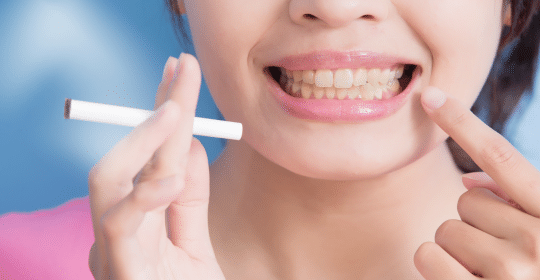
How Does Smoking and Tobacco Affect Your Teeth?
It’s no secret that smoking is bad for your general health, but it also negatively affects your teeth. Besides the obvious hazards of potentially developing lung cancer, cigarettes and tobacco stains your teeth, causes bad breath, damages your oral cavity, and because tobacco causes tooth discoloration it can leave permanent stains on your teeth that cannot be whitened. Tobacco products can also cause a diminished sense of taste, hinder your immune system, and a reduced ability to recover after surgery.
Smoking and Gum Disease
Smoking is one of the most noteworthy risk factors associated with gum or periodontal disease, which causes inflammation around the tooth. This irritation can affect the bone and other supporting structures, which can result in tooth loss. In addition, gum recession can cause adverse effects on crowns and other tooth restorations. Ultimately, the effects of smoking on teeth can lead to tooth decay, and pose a challenge in trying to implement restorative dentistry.
Vaping and Your Teeth
Vaping can also have a negative effect on your teeth and overall oral health. Although vaping appears to pose fewer health risks for the lungs than smoking cigarettes, it is tied to several adverse problems directly related to your oral health and the use of nicotine intensifies them. Vaping aerosols can also increase gum inflammation and overall inflammation in your body.
Side effects that may occur as a result of vaping:
- Bad breath
- Tooth decay
- Periodontal diseases – gingivitis, periodontitis and receding gums
- Bone loss
- Tooth loss
- Dry mouth
- Plaque accumulation
- Teeth stains and discoloration
- Teeth grinding
Is It Time to Quit?
Do you want your teeth for the rest of your life? Now might be the time to quit smoking. Male smokers are up to 3.6 times more likely to lose their teeth than non-smokers, and female smokers are 2.5 times more likely. Now might be the time to stop using tobacco products altogether.
Your Teeth Say A Lot About You
Your teeth are often the first thing people notice about you. If your smile is dull or discolored, or you have bad breath from smoking, you are not representing your best self.
Because of the oral health implications of tobacco use, it’s important to make an appointment with Dr. Angela S. Evanson, DDS to have a thorough examination and to have your teeth cleaned. Newly cleaned teeth can be the incentive for kicking the habit.
How Do I Quit?
The Centers for Disease Control and Prevention (CDC)’s cites five steps for quitting the use of tobacco products. They also sponsor the Quitline, which is an online program for smoking cessation.
CDC’s Five Steps to Quitting
- Set a date to quit. Prepare mentally.
- Seek support from your friends and family, and Dr. Evanson.
- Learn to cope without cigarettes and build in behavioral distractions, such as chewing sugarless gum, or going for a walk when the urge to smoke comes up.
- Prescription and over the counter medications, such as a transdermal nicotine patch or nicotine gum are effective in tapering off of nicotine vs. going cold turkey.
- Prepare for setbacks and seek help for overcoming obstacles or relapses.
Contact Dr. Evanson online or call (720) 409-0008 to make an appointment. Her office is located at 17167 E. Cedar Gulch Parkway #202 in Parker, Colorado, providing easy access to patients in the communities of Highlands Ranch, Aurora, Castle Rock and Lone Tree.
The first step is always the most difficult, but having a healthy smile might give you the right incentive to quit tobacco use. You will live a longer and healthier life, and your mouth and teeth will thank you for it.






